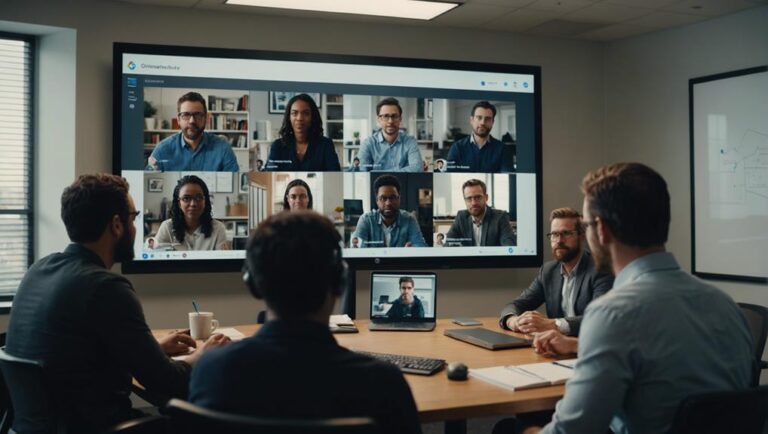Incorporating Socialization and Team Building Activities in Remote Teams
To strengthen team bonds in remote work setups, integrate socialization and team building activities. Virtual coffee chats and online team games foster camaraderie and collaboration. Icebreakers like 'Two Truths and a Lie' encourage participation and communication. Using digital platforms enhances team interactions, offering a bridge for remote colleagues to connect. Regular team check-ins promote effective communication and teamwork. Embrace informal interactions through virtual happy hours and game nights to build a sense of community. Overcoming challenges like trust-building and clear communication are essential. Celebrate achievements virtually to boost morale and team cohesion. Discover more benefits of these activities for remote teams.
Importance of Socialization in Remote Teams
Socialization plays a crucial role in fostering a sense of connection and camaraderie among members of remote teams, contributing greatly to their overall cohesion and productivity. In the virtual landscape, creating opportunities for remote team bonding is essential to maintain a strong team dynamic.
Virtual happy hours, where team members gather online to unwind and socialize, provide a relaxed setting for conversations beyond work-related topics. These moments of informal interaction mimic the watercooler chats of traditional office settings, allowing for personal connections to flourish.
Moreover, engaging in online team games can be an effective way to boost morale and teamwork. Collaborating in virtual escape rooms or participating in friendly competitions not only adds a fun element to the workday but also encourages teamwork and problem-solving skills.
These virtual watercooler moments and team-building activities help bridge the physical gap between team members, fostering a sense of community and trust within remote teams.
Virtual Icebreakers for Team Building
Virtual icebreakers are essential tools for fostering team cohesion and building relationships in remote teams.
Icebreaker game ideas can help break the ice and create a sense of camaraderie among team members.
Icebreaker Game Ideas
Engage remote team members effectively by incorporating innovative icebreaker game ideas to foster rapport and collaboration in virtual environments. Icebreaker challenges are essential for online bonding and enhancing virtual team building.
Creative connections can be established through interactive activities that break the ice and encourage team members to engage with one another in a fun and relaxed setting.
One icebreaker game idea is the 'Two Truths and a Lie' activity, where each team member shares two true statements and one false statement about themselves, prompting others to guess the lie. This game not only helps team members get to know each other better but also encourages active participation and communication.
Another engaging icebreaker is the 'Virtual Scavenger Hunt,' where team members race to find specific items in their homes within a set time limit. This activity promotes teamwork, problem-solving, and quick thinking, fostering a sense of camaraderie among team members.
Facilitating Virtual Connections
To promote effective team building and enhance virtual connections, integrating interactive icebreaker activities is vital in facilitating engagement and collaboration among remote team members. Virtual icebreakers play an important role in breaking down barriers, fostering communication, and creating a sense of camaraderie in dispersed teams.
One effective method is to organize virtual coffee chats where team members can gather in a casual setting to discuss non-work-related topics, share personal experiences, and get to know each other on a more personal level. These informal interactions help in building trust and strengthening relationships among team members.
Another valuable approach is hosting online team lunches where colleagues can virtually dine together while engaging in light-hearted conversations. This type of activity promotes a relaxed atmosphere, encourages bonding, and provides an opportunity for team members to unwind and socialize outside of formal work discussions.
Engaging Virtual Team Activities
You can enhance team cohesion and productivity through engaging virtual team activities like virtual icebreaker games and collaborative project challenges.
These activities not only foster a sense of camaraderie among team members but also promote effective communication and problem-solving skills.
Incorporating such activities into your remote team's routine can help create a positive and dynamic work environment.
Virtual Icebreaker Games
Implementing virtual icebreaker games is a beneficial strategy for fostering camaraderie and enhancing communication among remote team members. Remote bonding activities like icebreaker games play an important role in breaking down barriers, especially in online team environments where physical distance can create a sense of isolation. Online team games offer a platform for team members to engage in light-hearted interactions, get to know each other beyond work-related tasks, and build trust.
These icebreaker activities can range from simple questions about hobbies and interests to more interactive games like virtual scavenger hunts or Pictionary. By incorporating these fun and engaging activities into virtual meetings or chat platforms, teams can create a more inclusive and supportive environment.
Research has shown that teams that participate in regular icebreaker games tend to have higher levels of engagement and collaboration, leading to improved overall team performance. So, next time you're planning a remote team meeting, consider starting off with a virtual icebreaker game to set a positive tone and strengthen team connections.
Collaborative Project Challenges
Engaging virtual team activities through collaborative project challenges can greatly enhance teamwork and productivity in remote work settings. Project collaboration in virtual teams faces unique obstacles that can hinder the team's success. One major challenge is the lack of face-to-face interaction, leading to potential misunderstandings and miscommunications.
To overcome these remote obstacles, effective communication strategies are key. Encouraging open and clear communication channels, utilizing various digital collaboration tools, and setting regular check-ins can help bridge the virtual gap and foster a sense of unity among team members.
Incorporating structured collaborative project challenges can also promote virtual teamwork by encouraging members to work together towards a common goal. These challenges not only enhance problem-solving skills but also strengthen team cohesion and trust. By focusing on specific tasks or objectives, team members can leverage their individual strengths and expertise to drive successful project outcomes.
Leveraging Technology for Remote Socialization
Utilizing various digital platforms and communication tools can greatly enhance remote team members' social interactions and foster a sense of belonging and camaraderie.
Virtual happy hours and online workshops offer opportunities for team members to engage in informal conversations and bond over shared interests outside of work tasks. These virtual gatherings can mimic the casual interactions that often occur in traditional office settings, helping team members build personal connections despite physical distance.
In addition to scheduled social events, incorporating digital games into team communication channels can inject fun and friendly competition into daily interactions. Platforms offering multiplayer games or collaborative challenges can provide a break from work-related discussions while still encouraging teamwork and collaboration.
These digital games not only serve as icebreakers but also promote remote team bonding by creating shared experiences that team members can reminisce about and strengthen their relationships.
Benefits of Regular Team Check-Ins
Regular team check-ins serve as an essential component in maintaining effective communication and collaboration within remote teams. Weekly check-ins provide a structured opportunity for team members to come together, discuss progress, address challenges, and align on goals. These regular meetings not only keep everyone informed but also foster a sense of accountability and teamwork.
Moreover, beyond the work-related discussions, regular team check-ins contribute greatly to enhancing team cohesion. Virtual coffee breaks or informal chats before or after the formal meeting can help team members bond on a more personal level. These casual interactions allow team members to get to know each other beyond work tasks, building trust and strengthening relationships.
Encouraging Informal Virtual Interactions
Encouraging spontaneous virtual interactions among team members can greatly boost camaraderie and trust within remote teams. Incorporating activities like remote coffee chats, virtual happy hours, online book clubs, and virtual game nights can foster a sense of community and connection among team members, even when physically apart.
Remote coffee chats provide a relaxed setting for team members to engage in casual conversations, share ideas, and get to know each other on a more personal level.
Virtual happy hours offer a fun way to unwind after work, bond over shared interests, and build relationships outside of work-related tasks.
An online book club can stimulate intellectual discussions, promote continuous learning, and create common ground for team members to connect over literature.
Virtual game nights bring an element of fun and friendly competition, encouraging teamwork and collaboration in a relaxed setting.
Remote Team Building Challenges
Implementing remote team building challenges presents a strategic opportunity to enhance collaboration, communication, and trust within dispersed teams. In the domain of remote team dynamics, virtual teams face unique challenges that can hinder effective teamwork.
Building trust is one of the primary hurdles in remote team settings. To overcome this, it's essential to establish clear communication strategies that promote transparency and openness. Encouraging regular virtual meetings, fostering an environment where team members feel comfortable sharing their thoughts and ideas, and utilizing collaboration tools can help bridge the trust gap in virtual teams.
Additionally, addressing communication challenges such as time zone differences, language barriers, and technological issues is vital for fostering strong team dynamics. By implementing remote team building challenges that focus on improving trust and communication within the team, organizations can strengthen relationships, boost morale, and enhance overall team performance in virtual settings.
Celebrating Milestones and Achievements Virtually
To foster a sense of camaraderie and motivation in remote teams, acknowledging and celebrating milestones and achievements virtually can greatly contribute to team cohesion and morale. Virtual award ceremonies can be a powerful way to recognize individual and team successes, creating a sense of accomplishment and appreciation within the team. These ceremonies can include personalized messages from leaders, virtual applause, and even digital certificates to mark the occasion.
Another effective method for celebrating milestones and achievements virtually is through milestone video celebrations. These videos can showcase the journey towards a specific goal, highlighting key milestones and the efforts of team members. By sharing these videos during team meetings or through dedicated communication channels, team members can feel a sense of pride in their collective accomplishments.
Evaluating the Impact of Team Building Activities
Evaluating the efficiency of team building activities is vital for measuring their impact on team dynamics and overall performance. When appraising the effectiveness of team bonding exercises in remote teams, it's important to take into account the specific aspects of remote team dynamics and communication strategies that these activities aim to enhance.
To gauge the success of team building activities, it's essential to establish clear objectives and outcomes. Evaluating team bonding can be done through surveys, feedback sessions, or observing changes in team interactions. Look for improvements in communication, collaboration, and trust among team members as indicators of successful team building initiatives.
Remote team dynamics present unique challenges that can be addressed through targeted team building activities. Evaluating the impact of these activities involves analyzing how they contribute to overcoming communication barriers, fostering a sense of community, and enhancing overall team cohesion in a virtual setting.
Conclusion
To sum up, integrating socialization and team building activities in remote teams is essential for fostering a sense of connection and collaboration. Research shows that 87% of remote employees feel more connected to their team when they've regular virtual team building activities.
By prioritizing virtual icebreakers, engaging team activities, and leveraging technology, remote teams can overcome challenges and build strong relationships that lead to increased productivity and job satisfaction.
Remember, a connected team is a successful team.







